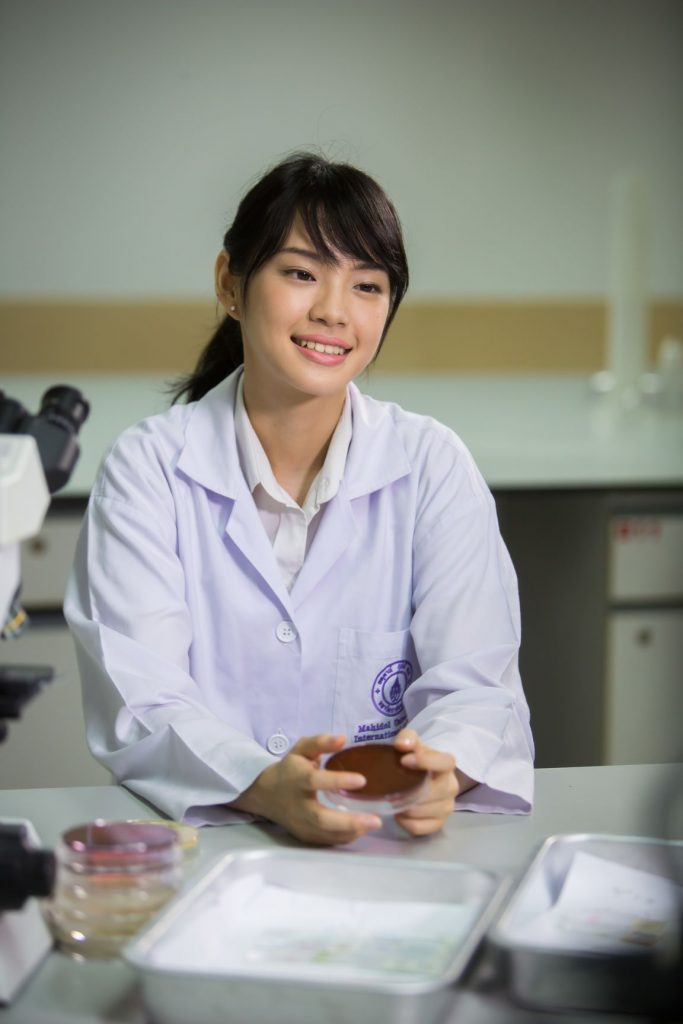We speak to Cherprang Areekul, an author in Royal Society Open Science.

When the experiment finishes what do scientists do with their time? In the case of one author in Royal Society Open Science, as well as winning awards, you get on stage to perform as part of one of Thailand’s biggest pop acts, as Cherprang Areekul discusses with us.
What is your paper about? Why are you interested in researching this topic?
This research paper is about the blue bottle experiment and similar demonstrations. In the classical blue bottle experiment, the blue solution turns colorless when left to stand and becomes blue again when shaken. The bluing and debluing cycle can be repeated a number of times. We discussed in the paper the likely mechanism of this reaction and proposed other possible ingredients that may make up the experiment. We also discovered in our newly proposed formulation that complex chemical patterns formed. The implication of the paper is beyond the chemical academic community where the experiment was first discussed. For example, the reaction may be developed in to an oxygen indicator or used to model Turing patterns found in nature at different scales from dots/stripes on animal to fairy circles (vegetation gap patterns) in Australia.
I like the simplicity and the beauty of this experiment. I started working on this project as a laboratory and research assistant under the supervision of Asst. Prof. Taweetham Limpanuparb (the first author of this paper) after his former students, Ms. Punchalee Montriwat (my co-author in my previous paper) and Mr. Pakpong Roongruangsree (the second author of this paper) received scholarship grants in Sweden and Canada, respectively. As a leading research university in Thailand, Mahidol University has given me the privilege to work on this project with a combination of financial and mentoring support.
This paper is my second publication on the topic and I hope to work on one more to fulfill my graduation requirements at Mahidol University International College (MUIC).
What do you enjoy about chemistry and how did this encourage you into a scientific career? How do you see your research and your career developing in future?
I worked on a science project when I was in high school. I enjoyed it so much, encouraging me to pursue a scientific career. I like science as I’m interested in finding out why things happen, for instance, how the human body works, etc. I think chemistry requires both memory and math skills. Aside from these, I also like to do wet lab work and observe things.
Regarding a career in science, I think I’d like to work as a science project manager, as I’m just an ordinary person who happens to be interested in science. I might not be the one who comes up with a new theory, but I would like to be the one who can understand and explain it to others, and also plan or manage a scientific research project. With my current career in the entertainment industry, I think I can be a speaker/influencer for science and make it more popular among many people.
About the research topic that I am interested in, I’m not sure yet. I like topics in physical chemistry, quantum chemistry, and if possible I also want it to be related to astronomy too, as one of my dreams is to go to outer space and see planet Earth with my own eyes.
How do you manage to do scientific research and be a popular (and busy!) musician as well? Are any of your band mates also scientists?
I have done scientific research before I even started my career as a performer. I wanted to learn how scientists do their projects and publish research papers, so I asked my advisor if I can work with him. As a university student, I also give adequate priority to my studies.
On the other hand, I was also attracted to the entertainment industry as I watched my favourite musical idols in AKB48, a Japanese girl idol group.
When the opportunity presented itself, I auditioned for and was accepted as a member of BNK48, an idol girl group music band based in Bangkok, Thailand, and is an international sister group of AKB48.
Once I started performing with BNK48, I found out that I didn’t have as much time as I had back then for my studies and scientific research. I hope when I graduate, I will have more time to focus on my research.
There are some BNK48 members who also study in science-related fields, such as environmental science, biology, etc. Some of our junior members are still finding their interest in science.
Why did you choose to submit this paper to Royal Society Open Science?
This decision was made by my supervisor and the second author before I started contributing to this paper. There are probably three main reasons why Royal Society Open Science is a perfect fit for our work.
- First, we love the concept of “Open Science,” transparency, objectivity, and timely editorial process, not to mention that access to the publications are free of charge to readers and authors (at the time of this paper submission, it was free to publish, but the journal still offers generous fee waivers).
- Second, we see that Royal Society Open Science is the perfect venue to communicate our work to audience outside the chemical academic community. Due to the multidisciplinary nature of Royal Society Open Science, we hope to spark interest in the blue bottle reaction in the wider scientific community.
- Third, we regard the Royal Society and the Royal Society of Chemistry as two high-quality international scholarly publishing houses in the UK, and find their active collaboration to be particularly interesting. We do not want to put all our eggs in the US basket, so to speak. My advisor sees benefits for his students to publish in different reputable publishers around the world to advance their career.
Find out more about how to submit your own research to Royal Society Open Science. You can also follow Cherprang Areekul on Facebook and Instagram.




